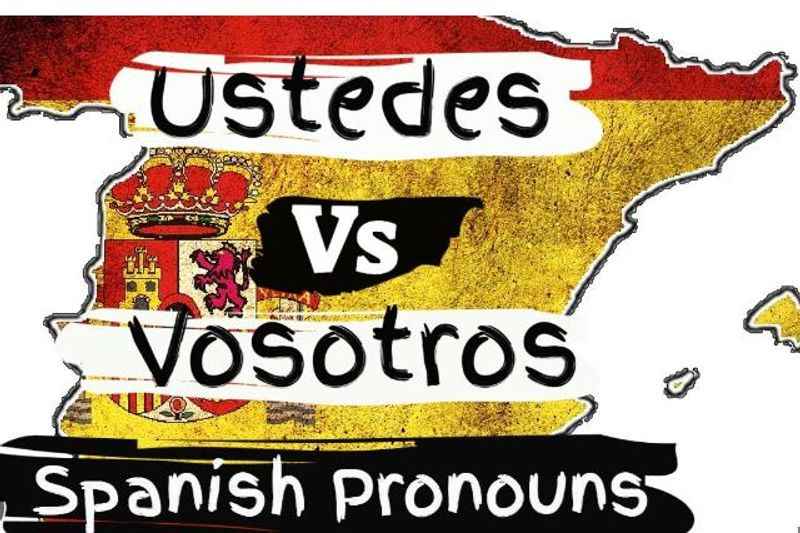What Does Vosotros Mean in Spanish? A Guide

Many Spanish learners don’t understand what vosotros means in Spanish, and they use this personal pronoun incorrectly.
In European Spanish, vosotros is a way to say "you" in the plural form in informal situations. It is the most common way to address more than one person.
This article will discuss:
- The meaning of vosotros in Spanish
- How to use the vosotros form
- Why it is important for a person to know about the difference between tú, vosotros, usted and ustedes
We'll also look at other ways to say 'you' across the Spanish-speaking world, and where these forms are used (particularly in Spain and Latin America).
Get ready to explore formality, basic conjugation of a Spanish verb, vosotros vs other forms of "you" and why learning Spanish is beneficial for travel.
'You Plural': When To Use Vosotros

So, what does vosotros mean and when do you use it?
In European Spanish, vosotros is a way of saying "you" plural in informal situations. It is by far the most common way to address multiple people when you're in Spain. In the singular form, the Spanish use tú. This becomes vosotros in the plural form.
In Spanish, we use vosotros as the subject pronoun. It takes the endings -áis/ -éis/ -ís in regular verbs in the present tense, depending on whether the verb is an -AR, -ER, or -IR verb. If you need a quick refresher on verbs in Spanish, you can check out our Guide to Regular Spanish verbs. Irregular verbs like ser are a little different.
Let's look at the following example of when to use the pronoun vosotros from the verb 'to be': Ser.
🇪🇸 Vosotros sois guapos 🇺🇸 You (plural, masculine) are handsome
🇪🇸 Vosotras sois guapas 🇺🇸 You (plural, feminine) are pretty
You'll notice the use of vosotras when addressing female plural subjects in an informal setting. If you are addressing a group of men and women, then you adopt the masculine form.
For example:
🇪🇸 Vosotros sois todos muy guapos 🇺🇸 You are all very good looking
Use of Vosotros and Ustedes in Context

Be aware that in some regions of Spain (particularly in the south), vosotros is often replaced by ustedes (the formal "you" plural). So, instead of 'vosotros sois' you may also hear:
🇪🇸 Ustedes son guapos 🇺🇸 You (plural, masculine) are handsome
Just think of ustedes as the formal version of vosotros. In Spain, when referring to a group of women, you would use vosotras. Notice that this pronoun is feminine due to the replacement of the 'o' with the 'a'?
In most cases, vosotros would be used when you talk to a group of friends. For example:
🇪🇸 Chicas, vosotras vais todos al partido esta noche? 🇺🇸 Girls, are you all going to the game tonight?
By contrast, in Mexico or throughout Latin America, you'd be more likely to hear the following Latin American Spanish equivalent:
🇪🇸 Chicas, van todas al partido esta noche?
Do you notice the difference in conjugation? This is the same for all verbs in Spanish. Ustedes, on the other hand, would be used when talking to a group of people who are not your friends and may command some form of authority, such as teachers (even your favorite teachers).
Other contacts that may require a formal construction of you plural include colleagues you do not know, or elderly people that are not your grandparents. You should always use ustedes unless you are confident you can informally address somebody.
Use sites like wordreference.com if you'd like to practice formal and informal conjugation in context. You will find more example sentences using the plural you online as well. It is also recommended to speak with a native speaker for practice.
Vosotros Vs Ustedes

Today, using vosotros forms of verbs __in Spain reflects familiarity with somebody. Spanish people use it frequently in conversation, as opposed to not at all in Latin American countries. In English, we would say "you guys" to mean the same thing.
In Latin America, the equivalent of vosotros is ustedes. Ustedes is commonly used throughout Latin America for formal as well as informal purposes. Vosotros is not used at all in Latin America, except by native Spanish people. Throughout most of Spain, ustedes is used only as a form of respect.
However, there are parts of Spain, particularly in the South in Andalusia and the Canary Islands, where the use of ustedes is more common than vosotros.
Example sentences
Keep in mind that both pronouns are useful and should be used as “you” plurals although verb conjugations differ.
Let's look at the examples below.
🇪🇸 Vosotras sois mis amigas favoritas 🇺🇸 You girls are my best friends
🇪🇸 Ustedes son mis amigas favoritas 🇺🇸 You girls are my best friends
🇪🇸 Vosotros os vais hoy o mañana? 🇺🇸 Are you leaving today or tomorrow?
🇪🇸 Ustedes se van hoy o mañana? 🇺🇸 Are you leaving today or tomorrow?
🇪🇸 Nosotros vamos con vosotros o solos? 🇺🇸 Are we going with you guys or alone?
🇪🇸 Nosotros vamos con ustedes o solos? 🇺🇸 Are we going with you guys or alone?
🇪🇸 Quiero hablar con vosotros sobre la conjugación del verbo ser 🇺🇸 I want to talk with you all about the conjugation of the verb 'ser'
🇪🇸 Quiero hablar con ustedes sobre la conjugación del verbo ser 🇺🇸 I want to talk with you all about the conjugation of the verb 'ser'
🇪🇸 Vosotros estais aprendiendo español juntos? 🇺🇸 Are you all learning Spanish together?
🇪🇸 Ustedes están aprendiendo español juntos? 🇺🇸 Are you all learning Spanish together?
Note that adjectives describing tú and usted need to be masculine when describing all men or mixed company, while they need to be feminine when describig all women.
Which Spanish Countries Use This Form of 'You Plural'?
As established, vosotros is only used in Spain, while ustedes is used throughout Latin America and other Spanish-speaking countries.
Latin American people use the second-person plural ustedes, rather than the Spanish second-person plural vosotros.
Is Vosotros Formal or Informal in Spain?
The vosotros form is informal and widely used in Spain, much like its singular counterpart tú.
However, the formal equivalent, ustedes, is rarely used in Spain unless referring to somebody in a position of seniority. Indeed, ustedes, or its singular counterpart usted are used in Spain only when speaking to a group of individuals of authority or more than one person that you do not know personally.
Other Ways to Say 'You' in Spanish

Wherever you are learning Spanish, you should know that the vosotros and ustedes pronouns are not the only two forms worth knowing. In other parts of Latin America, including Costa Rica, Colombia, Argentina, and Uruguay, the form 'vos' (el voseo) is used instead of tú.
In the plural, this still becomes ustedes. The voseo alters conjugation and is generally not taught outside of these countries. Let's look at some examples.
Look at the examples below.
🇪🇸 Vos tenés el regalo de Pablo 🇪🇸 (Pl) Ustedes tienen el regalo de Pablo 🇪🇸 Tú tienes el regalo de Pablo
🇪🇸 (Pl) Vosotros teneis el regalo de Pablo. 🇪🇸 Usted tiene el regalo de Pabol. 🇪🇸 (Pl) Ustedes tienen el regalo de Pablo.
All of these sentences mean the same thing. The difference is the use of the pronoun (usted, tú, ustedes and vosotros).
What is the Difference Between Vosotros and Nosotros?

It is not uncommon for learners of Spanish to confuse vosotros with nosotros, especially when they speak Spanish.
As established, you'll use vosotros when addressing a group of two or more people. This is similar to the English pronoun "you."
For example:
🇪🇸 ¿Qué tal, vosotros? 🇺🇸 How are you all?
Nosotros, on the other hand, is used when referring to "we" in the first person plural. This would be the equivalent of saying "us" or "we" in English.
For example:
🇪🇸 Nosotros somos estudiantes 🇺🇸 We are students
While vosotros is always plural, nosotros can be either singular or plural, depending on the context. So, now that you know the difference between vosotros and nosotros, how do you use them correctly?
The following examples should help:
🇪🇸 Vosotros sois mis amigos 🇺🇸 You are my friends
🇪🇸 Nosotros somos tus amigos 🇺🇸 We are your friends
🇪🇸 Vosotros vivís en una casa muy bonita 🇺🇸 You guys live in a really beautiful house
🇪🇸 Nosotros vivimos en una casa muy bonita 🇺🇸 We live in a really beautiful house
Key Takeaways: The Word Vosotros

We've covered a lot in this article. Let's look at some key takeaways.
- Vosotros is a pronoun used in Spain when addressing two or more people
- In Spain, the pronoun vosotros is the informal form of 'you' plural and is widely used
- When referring to only female plural subjects, we use vosotras
- English does not distinguish between singular and plural pronouns in the second person, but Spanish does
Remember also:
- Spanish speakers use this form when they talk among friends and family
- Ustedes is only used when addressing people of authority in the plural form
- In some Spanish-speaking countries, the pronoun vos (el voseo) is used instead of tú, but this becomes ustedes in the plural form
- Nosotros ("we") __is often confused with vosotros ("you").
- Nosotros is the Spanish equivalent of "us" or "we" in English and can be either singular or plural
The best way to use this plural form correctly is to practice! The more you use it, the easier it will become.
Why Learn Spanish Before Travel to Spain

Learning Spanish before traveling to Spain offers numerous advantages that can greatly enhance your experience in the country.
Firstly, it facilitates communication, allowing you to interact more effectively with locals, and understand street signs, menus, and public announcements, making navigation and daily activities smoother.
Secondly, speaking Spanish demonstrates respect for the country's culture and people. The effort to communicate in their native language is warmly appreciated, fostering a positive and authentic connection with locals.
Thirdly, learning Spanish opens doors to hidden gems beyond the typical tourist spots. You can engage in meaningful conversations with locals, gaining insights into their traditions, history, and way of life.
Moreover, being able to speak Spanish enables you to handle emergency situations more efficiently, seek help, or ask for directions.
Additionally, knowing the language makes Spain's rich literature, music, and films more accessible, deepening your understanding and appreciation of its culture.
Overall, learning Spanish before visiting Spain not only makes your trip more enjoyable and enriching but also opens your heart and mind to the vibrant tapestry of the Spanish-speaking world.
FAQs About Vosotros/ Ustedes in Spanish
Let's take a look at some frequently asked questions about vosotros and ustedes in Spanish.
Can I use the vosotros form in Latin America?
The vosotros form is generally not used in Latin America, or any Spanish-speaking country outside of Spain. Instead, Latin Americans use the ustedes form to address a group of people, both formally and informally.
Do you only use ustedes when talking to more than one person?
In Spanish, ustedes is commonly used to address multiple people in both formal and informal settings, making it a versatile pronoun for plural "you." The formal usted/ ustedes is used in Spain.
Why do Spanish-speaking countries use different words for "you"?
Spanish-speaking countries use different words for "you" due to historical and cultural factors. Local variations have emerged over time, creating distinctions between tú, vos, vosotros, and used.
This is similar to how there are many English dialects, such as British English, American English, Caribbean English, and so on. Spanish and many other European languages distinguish between the singular and plural forms of "you", unlike in English.
How many ways are there to say "you" in the Spanish language?
The Spanish language has four main ways to say "you": tú (informal singular), usted (formal or informal singular), vosotros (informal plural), and ustedes (formal or informal plural). There is also vos (used in some regions instead of tú).
Local customs determine which form is most appropriate in each situation. In Latin American Spanish, the ustedes form __is used informally, while in Spain, vosotros is used informally.
Summing Up: What Does Vosotros Mean in Spanish and How Do You Use It?
Understanding the nuances of vosotros in Spanish is helpful for effective communication with Spaniards, especially when interacting with native speakers of Spain Spanish.
V_osotros_ serves as an informal plural form of "you" and is widely used in Spain. However, in Latin America and other Spanish-speaking countries, ustedes is the preferred plural form for both formal and informal situations.
Learning the appropriate use of these pronouns, along with other variations like vos and tú helps learners navigate the rich linguistic diversity across the Spanish-speaking world.
Embracing these distinctions enhances language proficiency and fosters a deeper appreciation for the cultures they represent. Try to practice your vosotros basic verb endings before you visit Spain.







